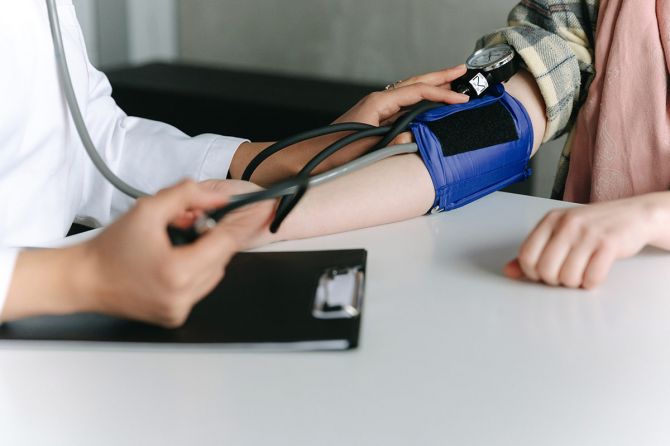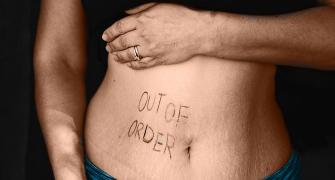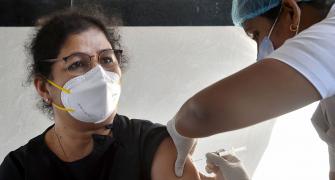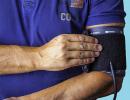1 in every 8 young adults in the age group of 18 to 25 years have high blood pressure.
Dr Praveen Kulkarni, senior cardiologist at Global Hospital, Mumbai, explains why youngsters need to be careful about their lifestyle to prevent hypertension.

High blood pressure or hypertension refers to a medical condition of high pressure in the blood vessels of the body.
It is one of the most prevalent medical conditions worldwide and a leading cause of morbidity and mortality in young and old individuals.
Sustained blood pressures more than 140/90 mm Hg is diagnosed as hypertension.
On World Hypertension Day, May 17, here are a few things you must know about the risks and causes of high blood pressure and what you can do to stay healthy
1. Hypertension affects all ages, genders
An estimated 1.13 billion people worldwide have hypertension. World over, 1 in 4 men and 1 in 5 women had hypertension.
In India, data shows that the overall prevalence of hypertension in adults is close to 30%. Studies show a significant increase in prevalence of hypertension from 4-5% in 1960s to 11% tp 15.5% in mid-1990s.
The last three decades have seen an alarming surge in the prevalence ,with a greater increase in urban (33.8%) than rural (27.6%) populations.
Also, 1 in every 8 young adults in the age group of 18 to 25 years have hypertension.
Even in diagnosed patients of hypertension, fewer than 1 in 5 people have the BP under control. This number is still lower in the rural areas.
2. Who is at risk?
As the increasing prevalence shows, every individual is at risk.
The risk factors for developing hypertension are: family history of hypertension, obesity, unhealthy diet rich in salts/processed food, sedentary lifestyle, smoking, diabetes, poor sleep hygiene, sleep apnea etc.
Age is a significant risk factor, though it is now not uncommon to see young adults with hypertension.
3. I have no symptoms. Can I have high BP?
Hypertension is also called a ‘silent killer’.
This is because a vast majority of hypertensive’s are asymptomatic, i.e, show no prominent symptoms.
Symptoms when seen include headache, giddiness, breathlessness, chest heaviness. More often, symptoms pertain to the complications of untreated hypertension that affects vision, heart, kidneys and brain.
Another popular myth that needs busting is the notion that patients of high BP will look agitated and anxious.
It needs to be emphasised that hypertension pertains to the pressure in the blood vessels and not the mental state of an individual.
4. Is hypertension fatal?
Nearly 10% of all deaths worldwide are attributed to hypertension.
Untreated hypertension causes irreversible damage to the heart, brain, kidneys, eyes.
Heart attacks and heart failure is a frequent complication.
In the brain, hypertension can cause stroke/paralysis and haemorrhage into the brain.
Vision loss due to progressive high BP is not uncommon. Hypertension is one of the leading causes of kidney failure and need for dialysis.
There is an established vicious cycle of hypertension causing kidney dysfunction which in turn aggravates BP.
5. How to diagnose hypertension
In the absence of symptoms, high BP can be diagnosed only after a physical examination and check up.
Therein lies the need for routine screening for hypertension in all adults, young or old, symptomatic or asymptomatic individuals.
These days, with easy accessibility to the electronic BP measuring devices, it is not uncommon for individuals to self diagnose high BP and seek medical care thereafter.
6. Test and treatment
As a majority of hypertensive patients don’t manifest symptoms early, by the time hypertension is diagnosed, patients may already have evidence of end organ damage.
That is why all newly diagnosed patients require a thorough assessment of kidney function in the form of kidney function test and a sonography if needed, detailed cardiac assessment with ECG with an echocardiography if indicated.
Also, in 5% of all hypertensive cases, high BP is secondary to underlying pre-existing kidney disease or certain hormonal imbalances.
In instances of unusual presentations like extremes of age, BP refractory to treatment, etc,referral to a specialist for work up and treatment for these causes is warranted.
7. How to alter your lifestyle
Any newly diagnosed hypertensive patient is advised to undertake appropriate lifestyle measures.
These include exercise, dietary changes, weight loss, sleep hygiene, destressing measures etc.
Minimum 30 to 45 minutes of any aerobic activity like brisk walking/jogging/swimming is an absolute must for all individuals.
BP is known to come down with sustained exercise. Diet rich in fruits, vegetables, nuts, fibre, fish and low on salt is of proven value in bringing the BP down.
For every kg of weight loss, BP comes down by 1-2 mm Hg. All overweight/obese individuals must work on losing weight. Need to avoid of smoking and excessive alcohol cannot be overemphasised.
8. Timely medication is the key
When lifestyle measures fail to bring the BP down or when BP readings are very high to begin with, oral medications are indicated for prompt BP control.
These anti hypertensive drugs are safe and effective. Also, any evidence of end organ damage to kidney, heart, eye or brain warrants prompt medications for BP control.
9. Follow up with your expert
Your blood pressure needs to be below 140/90 or 130/80.
Patients should have a regular follow up with the clinician for effective BP control and also for monitoring for any possible side effects.
Periodic assessment is needed for diagnosing any signs of hypertensive complications. Urge to stop or alter medication by self is definitely not advised.
10. When to quit medication
Mild hypertensives can expect to bring down the BP significantly by aggressive lifestyle modifications and can come off medications.
Obese individuals after weight loss can accept significant drop in BP.
Treatment of secondary causes of hypertension can normalise BP in a few patients.
Consult with your doctor about the timeline of medication and know when to quit.










